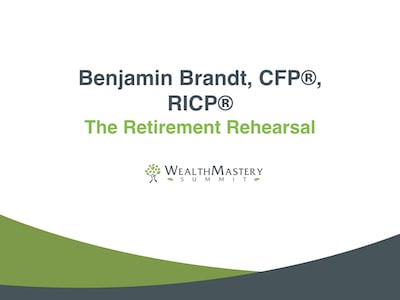Greg: Hello Wealth Masters, I’m Greg Phelps, your host to the Wealth Summit. Our mission with the Summit is simple; we want to educate and empower you with actionable tools, tips, and tactics to help you grow, protect, and maximize your personal wealth.
We do this by bringing you industry-leading experts in areas of financial and retirement planning, estate and tax planning, insurance, debt management, and investing.
And this morning I am absolutely thrilled to announce our featured guest, Benjamin Brandt. Benjamin, are you ready to help us master our wealth?
Benjamin: Of course, I’m happy to be here. Thanks for having me.
Greg: So for our Wealth Masters out there, Benjamin Brandt is a Certified Financial Planner. He is also founder and president of Capital City Wealth Management of Bismarck, North Dakota, a fee-only financial planning firm.

He’s also the host of the top-rated podcast ‘Retirement Starts Today Radio‘ and the accompanying blog.
Benjamin is an Iraqi combat veteran, having served in the North Dakota Army National Guard for eight years, including a 15-month deployment to Iraq in 2003. Thank you for your service, Benjamin.
Benjamin: Thank you for paying for my college!
Greg: You may have seen Benjamin featured in The Huffington Post, cnbc.com, Forbes Business Insider, Clark Howard, and many others.
In his free time, Benjamin and his wife, Kristen, can be found on the weekends at the hockey rink or on the gymnastic wrestling mats chasing their three energetic children.
I think that’s a pretty good intro but take a minute and just kind of sum it up and fill in any gaps and share a little bit more of your personal life, maybe.
Benjamin: So, as far as my personal life, you know, my wife and I have a lot of fun. She coaches hockey, and I love to watch my son wrestle and gymnastics and teaching Sunday School and all sorts of those fun things on the personal side.
On the professional side, I guess I can sum up what I do in a few words: I teach people how to retire. So we have a very narrow focus on our practice.
We don’t work with extremely old people or extremely young people. We work with people that want to learn how to live off their savings.
So that’s what we talk about on the blog and in the podcast and things like that. So we’ll talk about that today.
Greg: Well, there’s certainly no shortage of those folks out there.
So actually Benjamin, you’ve coined something I find pretty interesting, and you call it the Retirement Rehearsal, and so I’d like to go ahead and start off by sharing a little bit about that with the viewers and about what exactly is a retirement rehearsal.
Use wasted vacation time to prepare for retirement
Benjamin: I’ve been doing retirement planning for about 10 years now, and I kept running across a problem where when we’re sitting down and planning a retirement two or three years out people would talk about things like “I want to take my kids to Disney World”, and “I love golfing, I want to golf as much as I possibly can in retirement”, and “I want to take these trips”, and “I want to buy an RV or a second home” and things like that.

That’s kind of what we planned around because that’s kind of “the grass is always greener” . . . big fun items that we still think about in retirement planning.
The thing that really confused me is that a few years after retirement I would talk to a client and he would say “I am absolutely sick of golf, I can’t even look at my golf clubs because I golfed—you know—every day for three solid months and I’m sick of it” and thinking that was such a big planning item for clients.
So there’s this intangibility of what we believe retirement might look like.
But then, I’ve never retired, and my client said, I never retired either so, how do we create this intangible thing and make it more tangible and make our retirement plan feel more realistic to what our actual numbers are.
Then I came across a statistic that said there’s something to the tune of 52.4 billion dollars of unused vacation time that gets squandered every year, and most people just accumulate, accumulate, accumulate these vacation hours, and they’re at a 40-year high.
So I thought what if —how can we use this resource that most people aren’t going to be able to take with them into retirement?
I think something like a fraction of the percent of vacation hours actually get paid out to people when they retire so, how can we use this resource to improve our retirement outcomes?
Greg: That’s very interesting because I never realized that the number was that high and it’s pretty staggering! And as you said, I think a lot of people, they lose those vacation hours, don’t they? Or they get paid maybe a portion of it?
Benjamin: Around here, and this is anecdotal evidence, of course, the most generous options that we see as you get something like a fifth of your vacation or sick hours paid out to you as a lump sum. So you’re still losing something like 80%. We could be using that to improve your retirement outcomes if we do retirement rehearsal.
Prepare for retirement with a “retirement rehearsal”
Greg: Okay, so let’s talk a little bit more about that. So if I’m interested in trying a retirement rehearsal, you know, when should I consider doing this?
Benjamin: So, I would say two to five years from retirement, the first thing you need to have is a written financial plan because the retirement rehearsal is going to make those hypothetical numbers in your written financial plan.

It’s going to make them either real or overcompensating or under compensating. So we need to have a plan to tweak, and then preparing for retirement with “the retirement rehearsal” gives us a little dose of reality as to whether or not our assumptions in our retirement plan all real or not.
So the retirement rehearsal is taking some of those 52 billion dollars of vacation time, and it’s not taking a regular vacation like going to Barbados or something like that. It’s staying at home and doing absolutely nothing for a week or two weeks if you can.
You want to do a retirement rehearsal 2 to 5 years from retirement.
The reason for that being is like I mentioned earlier, it’s when we think about retirement planning we think about the big things, and that’s going to be like .002 percent of your actual retirement.
Your actual retirement is going to be a random boring Tuesday afternoon when you and your spouse are watching Night Court reruns and staring at each other.
That’s going to be the lion’s share of your retirement. So that’s what we should be practicing and finding out you know, how do I feel? What are my spending levels? Do I miss work? Do I miss my boss? Do I miss my colleagues? And start to practice or rehearse what that retirement looks like, and to see if my assumptions were accurate.
And what is my attitude about retirement? So you’re rehearsing every aspect of retiring by just staying home and doing nothing and seeing how that small dose of reality feels.
Greg: And so you’re going to use your vacation time to do this rather than squander it as you say you should consider doing this about two to five years before you want to retire?
Benjamin: Yeah
Greg: And so during this retirement rehearsal, you’re going to enjoy that random Tuesday afternoon of sitting on the couch and reading the paper and seeing if maybe I need to go out and do something and that may allude to changing your budget or changing your financial plan before you actually pull the trigger?
Benjamin: Right exactly. So there are three possibilities: you’re either going to spend less than you thought, more than you thought, or exactly as you thought.
So if you spend more than you thought, there’s a good possibility that you’re bored and boredom is a big red flag for retirement because usually when we’re bored what do we do? We take an extra vacation, or we have a spontaneous large purchase to try to fill that boredom hole.
Maybe it’s an RV or a second house or mistakes I’ve seen people make in the past is something that we didn’t plan for in the retirement plan, but they’re bored.
So they want to try to pull themselves out of boredom with spending, and that’s one of the most dangerous things that you can do, especially if you’re planning on retiring early like pre 65 years old.
So if you’re bored, that’s a red flag for increased spending in that case. We would encourage you not to retire and maybe explore some other options because you tried retirement and it wasn’t necessarily to your liking, and you’re bored, so we need to evaluate a different path. That’s why we want to do this 2 to 5 years from retirement.
If you spend the exact amount that you had planned for in your written financial plan, that’s perfect. That means you’re probably right on course and your hypothetical numbers are pretty close to reality.
But the fun part happens when you spend less than you would’ve thought because then we have quite a few options available to us. Either you can stop saving into your retirement accounts, or slow down your savings, which would give you more money to do some of the vacations and fun things, or it allows you to retire earlier.
This is something that catches a lot of people off guard, but when we think about the vacations and the big-ticket items that make retirement planning fun, is if you are entirely content with your random Tuesday afternoon, and you think maybe I’m not going to spend all that money I had planned for initially, or I was just too aggressive with my spending goals, and I’m not actually going to spend to that level.
Well, then you just bought yourself a year or two or three of retirement. You have to run all these numbers to a written financial plan and visit with your financial advisor to make sure that’s prudent. But you get to decide, and you could see reality turn the intangible into the tangible and see what your numbers really are.
Greg: So best-case scenario you’re going to find out maybe I don’t have to work until I’m 65 or 64. Probably best-case scenario I would say as well is you find out that perhaps I want to spend more in retirement than I thought I did and I need to spend another year working so I can make those dreams a reality as well.
Benjamin: Right, that’s exactly right.
Greg: And so I’m very curious because you alluded to something about spending, the budget, the retirement and we all know that retirement is a very critical time, especially early retirement for financial planning.
I’m very curious about your client base. What percentage do you say stick to their budget because I’m guessing it’s probably higher than people that don’t try the retirement rehearsal, right?
Benjamin: People that have practiced or have rehearsed retirement have had better outcomes because their hypothetical numbers are now real numbers, and they can have confidence in those numbers.
But clients that I have seen struggle are people that maybe quit their job because they were angry at their boss, or they got skipped over for promotion, or there’s something that pushed them into retirement, and they didn’t have anything to retire to, and they hadn’t rehearsed the retirement so that their hypothetical numbers, they didn’t feel the reality of those numbers until they were living it.
If we had under assumed, you know, then they’re going to overspend and we’ve seen you know, nest eggs get cracked and scrambled very quickly when you think you only need three thousand a month then you actually need eight thousand a month, you know, and there were quite literally stealing from the 70, 80, and 90-year-old versions of ourselves.
So you’ve got to make the numbers as real as possible because that’s the only way you can have some tangibility to you or financial.
Greg: I love the way that you phrase that. So we are stealing from the 70, 80, or 90-year-old versions of ourselves. And that’s really . . . you hit the nail on the head! That’s exactly what you’re doing.
You’re risking that late in life financial hardship. And I know a personally when I’ve seen clients and they do their retirement plans and if they’re off—let’s say—their budget goal of 50 or 60 thousand a year or whatever that number is, but if they’re off by as little as a couple of hundred dollars a month that’s 2400 dollars a year and then all of a sudden that makes a massive difference in the rest of your life.
Benjamin: Right. So if your portfolio is an engine and you know, you’re asking it for retirement income horsepower, the longer you red line that engine the quicker it is going to break down. So we need to plan for that ahead of time and decide, you know, do we need a Corvette engine or do we need a Camry engine? And then we have to invest accordingly, right?
Practice Retirement
Greg: Yeah. I’m also very curious because I did read your blog and I saw something on there called The Practice retirement, which sounds very similar to a retirement rehearsal, but I’m just curious how these are different from each other?

Benjamin: So the practice retirement comes after your retirement rehearsal and let’s say you rehearse your retirement. You said I’m kind of bored. I feel like I have something left to give my career. I miss my co-workers. I feel like I’m just not ready to retire yet. I tried the rehearsal, and I’m just not ready yet. But I still don’t miss out on some of these opportunities.
So what we do is we max out, or we use the maximum amount of retirement. You should pay every year, and we do both, we live our retirement, and we continue our career at the same time.
So that means maybe dropping down to part-time or working in cycles where we do, you know, six weeks on, one week off, six weeks on things like that. And then we do all those retirement fun activities without retiring.
So that allows you or retirement portfolio to continue growing you get to continue making retirement plan contributions.
You’re taking out less than in your portfolio, and you’re acting like you’re retired. So you are practicing retirement before you fully commit to retirement. So you’re phasing yourself out and in planned increments.
So the retirement rehearsal is a pause in your career for a week or two and then going back to your career for those last two to five years and then using the data that you’ve got to tweak your retirement plan. The retirement rehearsals living both at the same time and phasing into retirement.
Greg: The practice retirement is living both at the same time.
Benjamin: The practice retirement is living both at the same time and maximizing whatever vacation or sick leave or whatever. It is sabbatical that you have.
Greg: Yeah, I was going to say it sounds like almost a sabbatical that you schedule out where you actually can enjoy a little bit of retirement without pulling the trigger, right?
Benjamin: Exactly
What’s your “retirement calling”?
Greg: You know from a philosophical standpoint though, I think there’s a lot of things that people think like retirement’s this big scary thing. And you know, I don’t see that they think past of what are they really want to do during retirement.

You talk in your blogs and on your podcast about kind of your retirement calling. Can you speak a little bit to that and how that plays into the retirement rehearsal?
Benjamin: I think a lot of times we’re stuck in the context of the present and it’s hard to read Ray Kurzweil or something and think about being a futurist. But I think there’s a really good chance that if they solve heart disease or if they cure cancer sometime in the next 20 years our clients that are retiring today could live to see a hundred and some of them could live to be a hundred and ten or a hundred twenty. That’s a guess and we can only deal with the facts of today.
But the best outcome that we can help create for a client is creating a lifestyle that they don’t want to retire from, so another way to think of that is transition your career to your calling.
So think about what is it in your day-to-day life that makes hours pass by like minutes, and write that down and also write down what the quickest parts of your day are, and that’s an excellent indicator as to what you’re calling might be.
If we can incorporate that into your retirement whether that be if you have enough financial assets, maybe that’s a volunteer opportunity that keeps you getting up every morning and keeps you driven.
If our financial resources aren’t there yet, maybe that’s something that we can derive some compensation from, and then, of course, there would be fewer demands from our portfolio.
So transition from your career to your calling and then see how that might improve your retirement plan outcome.
Greg: And so your retirement calling could be charitable endeavors, it could be volunteer work. It could be spending time with your grandkids that you haven’t seen that much.
Benjamin: It could be. Maybe you love to play the guitar. And so, you know you go to different nursing homes and you play guitar for people right as a volunteer.
Or if your financial numbers aren’t where you’d like them to be, then maybe you teach guitar lessons at the local college or something, or you give you know private lessons in your home.
That’s just one example. Perhaps you love to golf, but you want to teach golf to other people, you know, whatever it is that you enjoy doing. It doesn’t feel like work. We need to examine that a little bit further and find out how we could use this as a tool to improve our retirement.
Greg: It doesn’t feel like work. So it might be something that still generates income, but it doesn’t feel like it’s like getting up in the grind every Monday morning.
Benjamin: Right. We should look at that in the context of a written financial plan so that we have numbers to tweak. So it’s not just feelings, we need to put some data behind it and then have some confidence in it.
Greg: And so do you build those income streams into their retirement plans? For example, let’s say my wife and I are going to retire at 62, but I know as you mentioned maybe I like hang gliding and I want to take people on hang gliding lessons and teach them how to do that.
But you build the income from hang gliding lessons that I’m giving for the next five years into my retirement plan?
Benjamin: We would look at it both ways, so we go through Monte Carlo analysis, which looks at a bunch of hypothetical market outcomes, and it gives you a percent probability.
So let’s say you’re at a 60% probability based on your assets to hit all of your income goals, and it was okay. What if we looked at earning $1,200 a month for the first five years of retirement and that could be anything.
It could be that you’re working at Walmart as a greeter. It could be something that you is your calling. If it’s your calling, you could do it a lot longer than five years.
But then we look at how that would increase your percentage outcome. So maybe we move from 60 to 70 percent.
Well, that feels like a pretty significant improvement. I want to investigate this further, maybe it improves it from 60 to 61 percent, and well, we’re going to have to do some further work beyond that so we would run the numbers and see if it’s impactful to what level, and would that be worth it to investigate this further.
Greg: So to that end just looking at the numbers, if you’re going to add a stream of revenue into a client’s financial retirement plan, that could easily allow them to escape their 9 to 5 day-job or the grind earlier, right?
Benjamin: I think that’s something people underestimate so much is that when we look at 30 years worth of compound interest and your average retirement plan, someone retires at 60 and you plan for the age of mortality of 90, but if you can factor in 5 or 10 years of part-time income even something, you know, $10,000 a year doesn’t sound very significant.
If you’ve got a 500 thousand or a million-dollar portfolio, $10,000 doesn’t sound very significant. But if you keep that 10,000 in there for 10 or 15 to twenty or thirty years, you know that’s able to compound into a pretty substantial amount of money.
So every bit of money we can fill in your portfolio just buys us a higher probability of success.
Greg: Can you speak real quickly on the sequence of returns risk and how having that early stream of income early on retirement might reduce some of those positive or negative impacts?
Benjamin: So we know that the returns of the markets aren’t linear, and when we go to Vanguard.com or Fidelity.com and we think we’re going to get a 5% return in retirement and that’s going to project out five percent every year growing with inflation.
But the reality of the market returns aren’t linear right there and are completely unpredictable. That’s plus 7, minus 7, plus 30, minus 22, minus 24, plus 15, but it averages out to plus 7.
What sequence overturns risk says is that you have a 30-year retirement and you’re 20, you have a 2008 type scenario. Well, you only have ten years left in your retirement plan. So you’re able to recover from that relatively quickly.
But if you would reverse that and five years into retirement you have a 2008 scenario, well now you’ve got 25 years left to try to get some horsepower out of the engine, which is your portfolio.
You’re less able to recover because if that bad, and that’s called sequence of returns risk if that bad event happens early on in retirement. It’s so much more difficult to recover because not only are you taking four or five percent of your portfolio every year and on top of that you’ve lost twenty or thirty percent.
It’s really hard to bounce back from that early on; later on, is not a problem. That’s why part-time work in retirement, or a phased retirement or a practice retirement or whatever we want to call it.
If we can do that for two years or five years or ten years that’s easy to do if we have a calling rather than a career that’s going to really limit those sequence of returns risk because rather than drawing four to five percent of your portfolio each year now, we’re drawing two to three percent because we’re supplementing that that income need with part-time income. So it really improves your outcomes.
Greg: So you’re leaving more money in the portfolio to continue to grow if we are drawing less, and you’re reducing the chances that you might need to draw some capital from your portfolio in a bad market because you’ve got a little bit of an income stream that is not really work, it’s your calling.
Benjamin: Right exactly, the more money we leave in our portfolio when this bad market downturn does happen and that’s probably going to be you know, if you’re early in retirement, there is probably gonna be a dozen times when you just hate your portfolio and wish you had chosen something different.
But the market generally bounces back and when we’re demanding less horsepower from our engine it is faster and recovers quicker. So there are many ways to win with part-time work in retirement. I encourage it for just about everybody.
What’s your retirement “why”?
Greg: So another thing that I picked up on in your blogs and your podcast is just what is a retirement Why, and is that different or the same as a retirement calling?
Greg: So another thing that I picked up on in your blogs and your podcast is just what is a retirement Why, and is that different or the same as a retirement calling?

Benjamin: It’s similar, you know, why is it you want to retire? We all go to work for eight hours a day, and we’re going to have this 40 hour a week void in our lives once you retire.
So it’s essential to retire to something, or as we mentioned before, you know, you’re going to get bored and all sorts of bad things can befall you when you’re bored in retirement.
So finding your retirement “why” are the people and the hobbies and the different situations that you might find that hours pass by like minutes. And it’s very likely that that could be your calling.
So your retirement “why” is what specific thing are you retiring to. It’s not just an arbitrary day of I turn 62, and I can collect Social Security, so I’m just going to pull the plug on my career.
Or I turn 65, and now I don’t have to worry about the health insurance thing anymore I can apply for Medicare, and then I don’t need my employer-sponsored plan anymore, I can just retire.
So it’s changing the equation to say retirement isn’t an arbitrary day based on having another birthday, it’s I’m retiring to the next chapter in my life.
So I’m retiring because I want to spend more time with my family or I want to spend time with my grandkids. Or I’m retiring because I want to serve on the board of the VFW and improve the lives of veterans. Or I’m retiring to do something. So why do you want to retire?
And if you say I hate my boss well that’s the wrong answer. We’re not retiring to something. We’re running away from something.
So tell me why you want to retire, and then we can start to build a retirement plan based on that career to calling and all those things we talked about previously.
Greg: You know, I’m curious as to the structure of the implementation of the retirement rehearsal and specifically the retirement “why” and the retirement “calling.”
So when you have a retired couple, and obviously they are going to have different concepts about money and risk tolerance and things like that.
So how do you recommend that they discuss this retirement calling, retirement Why and you know these concepts.
Benjamin: Well, it’s usually a little strange, you know, we’re the only fee-only firm in my area. So most of the time when clients visit with me, they’re expecting me to pull out some glossy brochure of some equity-indexed magical something that’s going to solve all their problems.
I want to ask them “why is it you want to retire” and “how does that make you feel?”
They sort of squirm a little bit because they were expecting me to promise them some magical returns or something and the numbers are insignificant unless they’re looked at in the context of what it is you are actually trying to accomplish.
So there’s plenty of time to talk about retirement numbers if we’re two to five years from retirement, but creating a solid financial plan of what it is that you’re trying to accomplish that makes retirement planning so much easier.
So a lot of times the male spouse is going to be more conservative about the numbers, and it’s a little easier to get the female spouse to tell me the Why because they’re interested in grandkids and things like that.
But with enough planning and enough lead time, we are able to have some of those conversations that just don’t come naturally. This isn’t something that we think that we’re going to talk with our financial advisors about, but it’s crucially important.
Greg: Yeah, I imagine the look on their faces is just amazement when you dig deeper and you say what is it that you really want to do with your retirement?
What’s memorable and purposeful about the next 30 years of your life that you want to be remembered for?
Benjamin: Yea we only get one chance at retirement. So, you know, even if asking the touchy-feely questions which can be a little bit awkward, your financial life is the second most intimate thing you can discuss with someone, but it’s absolutely worth it.
We only get one shot at it. So why not, you know measure twice and cut once right?
Greg: So Benjamin, you know kind of in closing, can you give us a fun story or just how this retirement rehearsal concept has been implemented and some of the results?
Benjamin: Well, I would say I don’t know if I have any good success stories that came directly from the retirement rehearsal, but looking back at people that we could have improved their lives if we would have thought about this sooner.
I take a lot of lessons learned and we talked about that on the podcast or we talk about it when interviewed by other people. Our great hope is that other people can take that lesson and through the blog, we’re trying to shorten the learning curve for everyone else by using lessons that either was or weren’t implemented by the people that we’ve worked with over the last decade or so.
So I don’t have any specific success stories about the retirement rehearsal, but I’m hoping that they are out there and if we have any podcast listeners, I’d love to hear any success stories that we could share with our audience.
Greg: I’m sure they’re out there. I guarantee that, and you’re right . . . I mean, we only get retirement once!
So for the Wealth Masters out there, I just want to reiterate a couple of things. You know again, we only get this option to retire once in our lives, assuming that we do it correctly.
I tell people there’s no way that I would ever remotely even consider retirement without a really thorough retirement plan with all the numbers and like Benjamin mentioned the planning, and the cash flows, and the Monte Carlo analysis. These things are critical because you only get one shot at it.
Now that I’ve had a chance to meet you Benjamin and hear a little bit more about the retirement rehearsal, I think that that’s something that is critical to implement into that process as well.
So there’s a couple of really big value bombs there and takeaways where there is a ton of money that is just left on the table from unused vacation.
So why not use that to try this out to see how you feel on a Tuesday afternoon when nothing’s going on. Are you going to spend more? Are you going to be bored? Do you really want to retire? Because once you pull the trigger, you can’t get it back.
So ease that retirement rehearsal into a full practice retirement makes a lot of sense to really fine-tune the numbers and actually still enjoy a little bit of retirement early.
Another really big takeaway that I got out of this process can actually allow you to retire earlier than you ever thought, but you’ve just got to put the pen to paper and get a qualified advisor to help you walk through it, and finally, your retirement “calling” and your retirement “why” are very close.
The calling is hopefully the short-term sequence of income streams that you might get by doing something that you absolutely love and that to me seems like a great way to fine-tune the numbers and make sure you can retire at the right time with the right plan in place.
Benjamin any other tips are tidbits that you’d like to add to that quick summary?
Benjamin: No, I think it’s “use it or lose it!” You know only about half of the states have specific requirements about allowing people to take their vacation hours with them.
So for the vast majority of people listening to this, it’s “use it or lose it.” So why not take this money that is only your’s temporarily and use it for its intended purpose and take up to two weeks staycation three, four, or five years away from retirement.
It can only improve your retirement outcomes. You got to do it in the context of a written financial plan because we’ve got to have something to tweak, but you won’t regret it.
Greg: And finally you need to start looking at this two to five years before you and think if you want to retire. Don’t wait until a year or six months before and try to pull this together. You’ll be leaving a lot on the table.
Benjamin: Right.
Greg: So, Benjamin, you are clearly the expert and the creator of the retirement rehearsal concept and for that, I appreciate you sharing that with us and I’m definitely going to be looking at implementing this as well to some extent with my clients.
Since you are the foremost expert and the creator, if our Wealth Masters out there want to reach out to you directly to get some coaching, counseling, or to learn more about some of these concepts and how to implement them, how would you prefer that they reach out to you?
Benjamin: Well, there’s several different ways. They could check out our podcast on iTunes ‘Retirement Starts Today Radio’, which is going to be if you enjoyed this interview, we interview other financial advisors.
Sometimes it’s monologues like the retirement rehearsal is a monologue that they can check out. It’s a few dozen episodes ago now. They can check me out on Twitter at ‘Retire Me ASAP’, or they could check out our website retirementstartstoday.com.
Greg: I’m going to go and subscribe to those because I’m already learning a lot. So I think that’ll be really neat and retirement starts today radio. Okay, Benjamin. I want to take a minute to thank you so much for sharing these concepts with our viewers.
